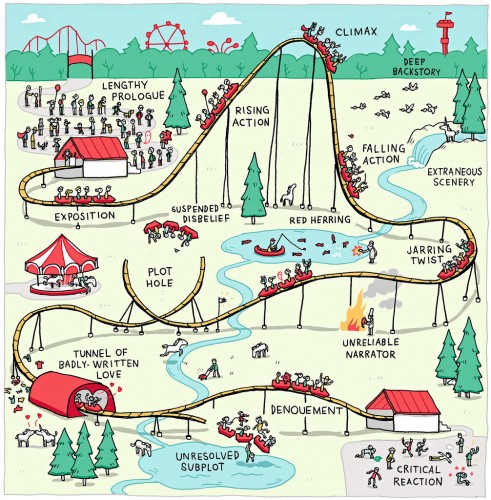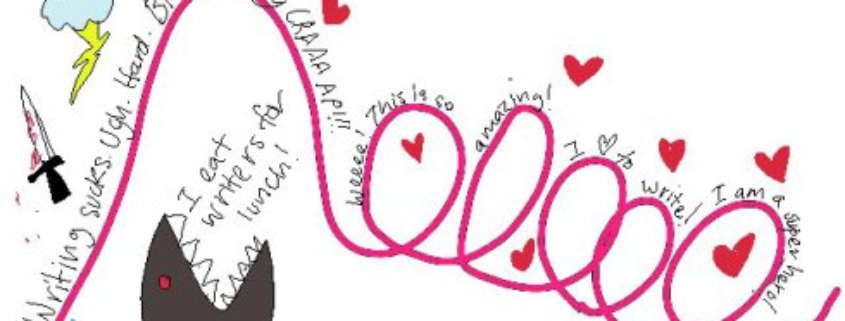The Courage it Takes
Sitting under a café umbrella recently, sipping iced tea with an MFA colleague, the conversation naturally, unsurprisingly, turned to writing. We’re both in our second semester of graduate school. As I’ve mentioned previously in this blog, I’m “Creative Nonfiction.” It’s a fact which never ceases to amuse my fiancé who takes it as an existential statement. My tea-sipping friend is “Fiction,” which amuses my fiancé even more.
Regardless of fictive or nonfictive embodiment, my friend and I both agree that the monthly packets we are required to submit to our MFA mentors are very real. Troublingly so. My most recent packet of twenty creative writing pages and two book annotations was due to my mentor in mid-August. For two days afterwards I celebrated its completion by not writing a single word (status updates and margin notes in Behind the Beautiful Forevers, of course, aside). On the third day I intended to get back to writing, but—nearly a week earlier than expected—I received my mentor’s return email: a detailed letter, in-line track change comments, and lecture notes on a particular topic she suggested I study.
I was paralyzed for a full week afterward.
Could. Not. Write. Anything.
I sat with my friend at the outdoor café during that time. It was one of those blazing hot Saturday afternoons when everything melts: ice in our drinks, lipstick in my purse, ego. We sat together, pulling our sweat-soaked shirts away from our backs, fanning cigarette smoke from the table next to ours. Inside the café, the A.C. was on full blast but the room was crowded with chatter, and she and I both had some things to get off our chests. She, too, had a hard time getting back to work after sending off her last packet.
“I’m afraid of criticism,” she said.
It was powerful to hear her express what I had been feeling. Of course criticism—particularly at the hands of a knowledgeable and supportive mentor—is meant to be helpful. Indeed, it’s a primary element of why we both came to this program: to receive critical feedback about our work. But the fear we associate with criticism is attached, I think, to shame. Shame that the basket we’ve put our eggs in is full of holes. Shame that we will fail. Shame that there is a right and wrong to writing and that, ultimately, it is just beyond our personal abilities to get it right. Fear that we are not capable of stepping into our highest creative self.
My friend’s reflection of my own fears was enough to remind me of a time, years ago, when I had not allowed my fears to stop me.
After years of studying classical music, sometime in college I ended up with an acoustic guitar and a book of folk songs. Joni Mitchell, Pete Seeger, etc. I had been raised on these songs by a guitar-strumming dad. My first concerts were folk festivals where my parents spread a blanket and we picnicked on my mom’s cold fried chicken and berry pies. The folk songs in the book hit a deeply personal spot from my earliest childhood memories. It was a place that classical music, as much as I loved it, had never tapped. The book was a doorway, and when I walked through it, I walked away from classical music, stepped onto a path of songs, and, shortly, started writing my own. Right away came the desire to sing for others. A moment later, my stomach clenched with fright.
Stage fright, like fear of criticism, can be debilitating. It can also be exhilarating. I’m not a fan of roller coasters, but I wonder if the draw to them is similar. Do coaster-lovers shake in fear? Do they wonder if they can handle it? Do they get a rush from the courage it takes to ride? This is what it feels like, for me, when I send in my mentor packets. I silently beg, as I hit send, that my mentor’s feedback will be enough to kindly push my edge, an edge just shy of disablement.
Often, to work out fears that arise in my new(ish) writing endeavors, I look back to my life in music. How did I overcome my life-long stage fright so that I could pursue my love of singing and songwriting?
I showed up.
Back then, I was up against all these same fears of failure and shame, but my desire to get better at my craft was larger than my fears. I knew the only way to improve was to do it. Perform. As much as possible. The solution? I joined the busking world. I didn’t have to wait for a club booker to let me in the door. I could pull up a piece of sidewalk and play every night, which I did throughout summer and fall until my fingers froze, and then again the following spring. There was a good community in my Boston busking world days—Amanda Palmer, Guster, Mary Lou Lord, and many others who passed through for a week or for years—but also, I learned to stand up in front of an audience. I learned to show up against my fears.
After a few hours at the café, our iced teas were finished, our conversation spent, our backs sweaty. I drove my friend several blocks to where she had parked.
“I made something for you,” she said as she unlocked her car. From the backseat she pulled out a pale green cotton bag with two wide shoulder straps and a red and white swath of cloth down the center. I can’t sew at all, but I appreciate the craft. Her stitches were perfect. The muted colors were imbued with my friend’s gentle spirit. The kindness was almost overwhelming. Fingering the stitches of my friend’s gift, I remembered something an old teacher used to say: How you do one thing is how you do everything.
I haven’t read my friend’s writing, not yet. Nor has she yet read mine. But I am certain that when the day comes for us to exchange not just our trepidations but our art, we will find in each other’s writing the level of courage, commitment, and care that we bring to our other arts and crafts. As with everything, sometimes fear stops us for a few days or a week. But always, every time, our desire to do this—to explore questions, share stories, to write—leads us through the turnstile and back onto the ride.

Grant Snider, an illustrator and cartoonist, draws the New York Times weekly online strip “Incidental Comics.”
image from:
http://www.nytimes.com/interactive/2013/07/14/books/review/12snider.html?_r=3&





